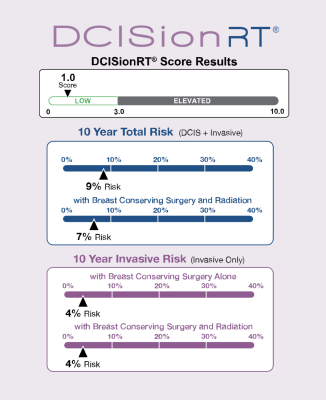
May 1, 2023 — Prelude Corporation (PreludeDx), a leader in molecular diagnostics and precision medicine for early-stage breast cancer, announced new results evaluating the decision impact for radiation therapy (RT) recommendations incorporating the DCISionRT test by race (White vs. Black) in women with ductal carcinoma in situ (DCIS) enrolled in the PREDICT study. The data was presented at the 24th Annual Meeting of the American Society of Breast Surgeons (ASBrS), held on April 26 - 30, 2023 at the John B. Hynes Veterans Memorial Convention Center in Boston, Massachusetts.
Previous studies have demonstrated that Black women, compared with White women, are more likely to have second tumors (invasive and noninvasive) in either breast or die of ipsilateral breast cancer (IBC) after DCIS. Although multiple studies have evaluated results on the treatment of invasive breast cancer, this study is one of the first to examine the impact of race/ethnicity on the treatment recommendations of DCIS patients.
The poster entitled, ‘A Comparative Analysis of Changes in Treatment Recommendation for Black and White Patients with Ductal Carcinoma in Situ Using a 7-gene Predictive Biosignature: Analysis of the PREDICT Study’, demonstrated significant changes in recommendations to add or omit RT based on DCISionRT results in 2,308 patients at 63 clinical sites.
The PREDICT study is a prospective, multi-institutional registry for patients who received DCISionRT testing as part of their routine care. RT recommendations were changed significantly in both 39% of White and 37% of Black patients. However, Black patients had a 10% higher rate of RT recommendation when compared with White patients with similar biosignature results.
“Previous research has indicated that there are greater risks of second tumors after DCIS in the Black population compared to the White population. In the PREDICT study, the higher rate of radiation treatment recommendations for Black women, suggest that clinicians may be influenced by these prior studies,” said Pat Whitworth, MD, FACS, FSSO, and Director of the Nashville Breast Center; Associate Professor, University of Tennessee; and Managing Partner TME. “DCISionRT is a powerful tool that enables physicians to identify which patients may have a significant or minimal benefit from radiation therapy based on the patient’s individual biology, thus eliminating unnecessary over- or under-treatment for DCIS patients.”
“Surgeons are often the first point of contact for patients in DCIS treatment decisions, and we are excited to present this latest data at ASBrS demonstrating additional clinical utility of our biosignature,” says Dan Forche, President and CEO of PreludeDx. “This data further establishes DCISionRT’s substantial impact in clinical practice on personalized treatment decisions for all DCIS patients.”
About DCISionRT for Breast DCIS
DCISionRT is a risk assessment test for patients with ductal carcinoma in situ (DCIS) that predicts radiation therapy benefit. Patients with DCIS have cancerous cells lining the milk ducts of the breast, but they have not spread into surrounding breast tissue. In the US, over 60,000 women are newly diagnosed with DCIS each year. DCISionRT, developed by PreludeDx on technology licensed from the University of California San Francisco, and built on research that began with funding from the National Cancer Institute, enables physicians to better understand the biology of DCIS. DCISionRT combines the latest innovations in molecular biology with risk-based assessment scores to assess a woman’s individual tumor biology along with other pathologic risk factors and provide a personalized recurrence risk. The test provides a Decision Score that identifies a woman’s risk as low or elevated. Unlike other risk assessment tools, the DCISionRT test combines protein expression from seven biomarkers and four clinicopathologic factors, using a non-linear algorithm to account for multiple interactions between individual factors in order to better interpret complex biological information. DCISionRT’s intelligent reporting provides a woman’s recurrence risk after breast conserving surgery alone and with the addition of radiation therapy. In turn, this new information may help patients and their physicians to make more informed treatment decisions.
For more information: https://preludedx.com
Related DCISionRT Content:
American Medical Association Grants PreludeDx a CPT PLA Code for Proprietary DCISionRT Test
PreludeDx Presents DCIS Precision Medicine Study Results at ASTRO 2021 Annual Meeting


 February 04, 2026
February 04, 2026 









